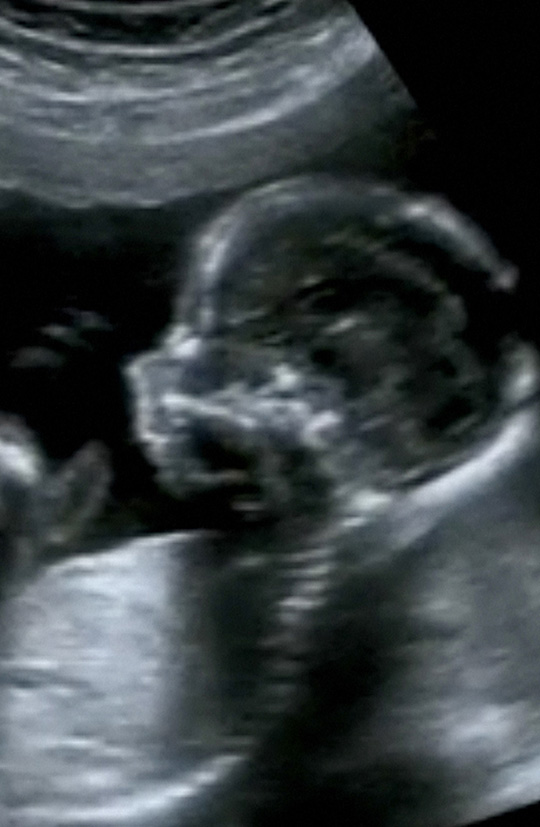All Referral Letters Accepted.
Bulk Billing Available(Conditions Apply)
Our Nuchal Translucency screening program performed at the 11th to 14th week of pregnancy is fully accredited by the Fetal Medicine Foundation, giving our patients the best possible information available to ensure a healthy pregnancy and the developing baby’s wellbeing.
Overview
Every foetus has a layer of fluid along the back of their neck. The thickness of this fluid can be measured during an ultrasound scan at this early stage of pregnancy. This measurement can be used to determine whether the baby is at increased risk of major chromosomal abnormalities such as Down Syndrome. Chromosomes contain the DNA that make up each person’s genetic blueprint. Sometimes the number or the arrangement of these chromosomes are abnormal, and can result in various syndromes. The most common of these chromosomal abnormalities is Down Syndrome. A chromosome problem is possible in ANY pregnancy. Although the risk increases with age, the vast majority still occur under the age of 35, as this age group have 90% of all babies.
Preparing
Gynaecological and Pregnancy ultrasounds require you to have a full bladder. It is necessary to drink 800ml-1L of water one hour prior to the scan and refrain from going to the toilet.
Scanning
The ultrasound waves are transmitted and collected via a hand held probe which is moved over the part of the body being investigated. You will not feel any pain or discomfort. Your procedure will usually take between 20 and 30 minutes. A highly trained sonographer will conduct the study.
Results
After the procedure the results will be reported by our radiologist, Dr. Himanshu Kaushik. You may wait while the images are prepared and reported or you can organise an appropriate time to pick up your results before your next appointment with your GP or specialist. They can also be provided via electronic transfer to your referring practitioner if requested. Comprehensive Medical Imaging strongly advises that you return to your referring doctor, in order for your doctor to discuss your radiology report with you.
FAQs
Should I have this Prenatal testing?
This is a personal and individual decision. The pregnant woman and her partner should have counselling with her doctor before undergoing the test, to gain a good understanding of the screening test, and to determine the implications of the test results. A screening test assesses risk – it does not definitively confirm or exclude the presence of an abnormality.
What does a low risk result mean?
A calculated risk of less than 1 in 300 (for example 1 in 1000) suggests a low risk. As this is a screening test, it is important to understand that a LOW risk is not the same as NO risk.
What does a high risk result mean?
A calculated risk greater than 1 in 300 (for example 1 in 100) is considered an increased risk, but once again this does not mean the baby will definitely have a chromosomal abnormality. The woman will need to discuss with her doctor whether to proceed on to have further prenatal investigations (such as amniocentesis or chorionic villus sampling).
What are the benefits of a Nuchal Translucency scan?
Non-invasive screening test for chromosomal abnormality with a high detection rate Accurate dating of the pregnancy Diagnosis of twin or multiple pregnancies Diagnosis of early pregnancy failure Assessment of early structural development of the baby A further ultrasound at 18 to 20 weeks is recommended as this is the best time to detect the majority of structural defects in the baby. The foetus at this stage is quite developed and in most cases the head, face, limbs and movements can be observed during the scan.
Can I eat before having a Nuchal Translucency ultrasound?
You can eat before your ultrasound. You are required to have a full bladder. It is necessary to drink 600-800ml of water two hours prior to the scan and refrain from going to the toilet before the scan.
Can I have a female sonographer/technician to perform the scan?
Yes, please let reception know when making your appointment. We have female radiographers and sonographers sensitive to the needs of female patients.
Is this test safe for my baby?
Ultrasound is a very safe and accurate investigative tool used to assess many organs in the body. Ultrasound uses harmless high frequency inaudible sound waves to obtain images. Ultrasound waves are not dangerous or irritating to adults or children. There is NO radiation with an ultrasound examination. Will the sonographer performing my scan tell me what’s wrong? It is the sonographer’s duty to perform the test and ensure the images are of high quality for the radiologist (specialist doctor) to interpret them.

